El Pombro
Reading Time: 9 min
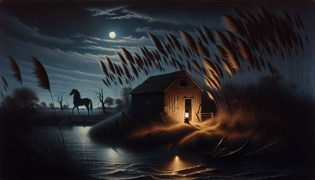
About Story: El Pombro is a Folktale from argentina set in the 19th Century. This Dramatic tale explores themes of Good vs. Evil and is suitable for Adults. It offers Entertaining insights. .
Introduction
Night draped itself across the pampas like a moth’s battered wing, and the lantern under the horse shed flickered with a desperate glow. A distant dog bayed, echoing across boundless grass, and María clutched her shawl against the chill. They said El Pombro moved without warning, an antithesis of nature with feet turned backward, its gait as unsettling as a broken reflection.
The air smelled of damp leather and wet earth after the brief dusk storm, and the wooden floorboards let out a creak as if protesting the silence. “Che, no seas cagón,” her husband whispered, voice taut like stretched hide, but even his bravado trembled. Each crackle from the hearth sounded cavernous, as though the flames themselves feared the coming night. (Smell of smoke lingered near the hearth, mixing with faint perfume of jacaranda blossoms.)
María recalled her abuela’s warning: never follow a set of backward tracks at midnight, for your soul would wander forever in reverse. She pressed her cheek against the cool wall, its rough adobe texture biting through thin wool. The wind sighed across the open plain, a lullaby of rustling pampas grass and distant hoofbeats. Somewhere out there came a hollow laughter, low and creaking like a lock unfurling.
Before dawn, they would confront the legend. Lantern in hand, her husband’s silhouette framed by moonlight appeared resolute. The pounding in her chest sounded like a restless stallion’s hoofbeats. She exhaled, tasting metal on her tongue. The hour of reckoning had begun, and El Pombro stirred beyond the fence line.
The Whisper in the Winds
Even as the first stars kindled in the velvet sky, a shape drifted along the fence posts, as subtle as a secret. The gaucho, Martín, crept forward, spurs muted by damp ground, each step muffled by soft gravel. He could feel the night wind brushing his neck like a cold finger. High above, carrion birds wheeled in the silver glow, their wings whispering warnings. Local folk would mutter “qué quilombo se arma si lo vemos,” recalling past panics when lanterns shattered in trembling hands.
Martín paused at an ancient quebracho post, its gnarled bark weathered and rough like a scabbed wound. He sniffed—the scent of brimstone teased the air, as if the devil himself had walked by moments earlier. Beneath him, tiny footprints pressed into dust: the front claws pointed forward, hind feet pointing back, a living cipher carved at midnight. His heart pounded like tameables roused by a ghostly herd.
A low hum reached his ears, an odd chorus of insects and a distant owl’s lament blending like an ill-fated waltz. Suddenly, a bitter tang of metallic fear stung his throat. He peered ahead and glimpsed a crouching figure: long arms scraped the ground, and eyes glimmered like shards of obsidian. It breathed softly, each exhale stirring stale straw in the adjacent corral barn.
Martín summoned his courage as though drawing on spurred adrenaline. He tightened his grip on the rifle’s cool wood, feeling its knotty grain under calloused fingers. The goblin rose, back arching like a haunted harpstring, legs reversed at the knees, ankles bowed in grotesque grace. Under that ghostly moon, its twisted silhouette resembled a fractured tree that refused to bend to natural law. A whisper, barely human, slithered from its lips: “Vení, gaucho, jugá conmigo.”
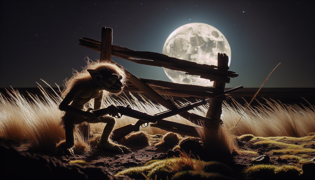
Footprints in the Dust
Dawn was far off when Martín traced the backward tracks deeper into the estancia yard. Each footprint seemed to taunt him, curling in the dust as if daring him to follow. He moved gingerly, mindful of every twig that snapped underfoot. The hedgerows around the corral rustled with small creatures scampering away at his approach. The air smelled of hooves and dew, a crisp tang that was both refreshing and unnerving.
Clay pots lay cracked by the fence, their rims jagged like broken smiles. Martín rubbed his fingers across one shard: cold, brittle, and flecked with clay dust. A distant wind whined through a rusted tin sign, shifting it so the letters clattered—a metallic whisper that sounded almost like a warning. His pulse drummed like distant thunder.
He followed the path around the stable, where straw lay scattered, damp with morning mist. Each step he took left prints behind, but the backward marks remained, as though El Pombro had hopped on one foot and skipped on the other. Suddenly, the faintest echo of a child’s giggle—too high‑pitched for any adult—drifted from the hayloft. Martín’s breath hitched like a startled horse.
He climbed the ladder to the loft, wood groaning beneath his weight, splinters biting into his palms. The loft was empty save for loose hay and the musty perfume of old grain; yet the tiny footprints curled around the beams overhead, defying reason. He reached for a lantern, its flame trembling, casting long, dancing shadows that seemed to leer back at him. A stray hay stalk brushed his cheek, rough as an unrolled scroll.
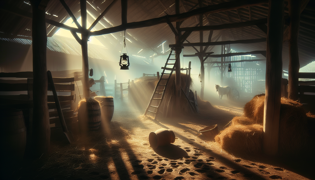
The Midnight Encounter
Night fell again with uncanny swiftness. Martín armed himself with a lasso and pistol, every sense sharpened. The wind had died; only cicadas hummed, their chorus oddly stifled. The moon hovered full and pale, bathing the landscape in argent light. A shiver crept through his spine: El Pombro was near.
He advanced toward the old silo, where children once stored feed for horses. Now its door hung ajar, lips of wood warped by damp. Martín exhaled, tasting smoke from his torch. He stepped inside, rough wood creaking beneath his boots. The scent of stale oats and mould rose to greet him, pungent as aged cheese. His torchbeam danced across overturned buckets and hanging ropes, revealing elongated shadows on stone walls.
A scuffle resounded from behind a stack of grain sacks—thump, scuffle, then a weird scuttling. Martín’s pulse pounded like an angry drum. He flicked his torch up: face to face with El Pombro. Its head cocked sideways, lips peeled back in a crooked grin, eyes reflecting flame like hot coals. Damp straw stuck to its matted hide, exuding an acrid funk. Its reversed legs flexed, ready to spring.
Martín flung the lasso; it whistled through the air, the hemp fibres rasping like fingernails on bone. The goblin leapt aside, light as smoke, and the rope whirled harmlessly. A guttural laugh ripped from its throat, each note a broken bell toll. Martín’s pistol roar filled the silo, splinters bursting like fireworks. The goblin tilted backward, its laughter subsiding into a low hiss, then vanished into the rafters—an echo of terror carried on night air.
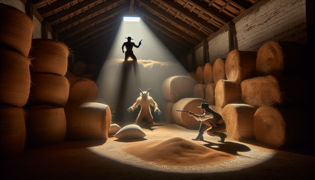
Dawn's Reckoning
By the first blush of dawn, Martín trudged back toward the house, body tense like a drawn bow. He halted when a tiny ripple of movement caught his eye: the backward footprints again, this time leading toward the kitchen door. He pressed his ear to the wood, hearing nothing but his own ragged breathing and the kettle’s distant whistle.
He flung the door open. Inside, María stood pale beneath the curtained window, stirring coffee with trembling hands. Her shawl dripped dew from the doorframe. She met his gaze, tears glinting like dew‑drops on spiderwebs. Beyond her feet lay more twisted prints, trailing under the hearth.
They searched the dim room by the weak lantern glow. A scrap of torn gaucho ribbon lay snagged on the fire poker, frayed threads smeared with crimson. The coppery scent of blood lingered in the air. Martín sank to his knees, palm pressed against the cool earthen floor, feeling its rough grit beneath. Somewhere behind them, a soft breeze whispered through the cracked window, carrying a faint, mocking sigh.
Then her voice broke the hush: “It’s gone, che.” She offered a trembling smile, but her eyes burned with questions. Martín nodded, raising his rifle at the empty threshold. The sun’s earliest rays touched the horizon, igniting golden ribbons across the sky. El Pombro’s tracks ended at the door, leaving no further clue.
They stood side by side as daylight spilled in, and the presence of the goblin receded into memory. The estancia exhaled, the wooden beams creaking with relief. Yet in every whisper of wind through the grass, they would remember the inverted goblin’s cry—a haunting lullaby that deathless night.
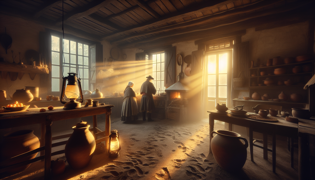
Conclusion
The sun climbed fully over the pampas, casting long shadows that retreated toward the east. Martín and María gathered around a simple wooden table, sharing bitter coffee to steady their nerves. Outside, the wind played among the grass like a restless child. For a moment, solace felt as delicate as cobweb lace, but it held.
They spoke little of that night, for words risked summoning fresh fear. Yet both knew El Pombro still prowled the outskirts, hiding where the fenceposts shadowed the land. In local taverns, the older hands would whisper about backward footfalls under the milky moon, and young ones—curious as fledgling raptors—would dare one another to trek into darkness. Martín would watch them, reflecting on courage’s fine line with madness.
As seasons shifted, the derecho winds carried new tales: a child saved from rabid dogs, a stray horse found trembling in a corral. Some swore they glimpsed those inverted tracks at dawn’s edge. But in each account remained a single truth: fear itself can be more monstrous than any goblin.
María placed her palm over Martín’s calloused hand, their fingers entwined like braided leather reins. “We beat it back,” she murmured. He nodded, eyes distant yet resolute. Somewhere beyond the fence, blades of grass quivered in silent salute.
And so El Pombro became legend, a shadow in the grass and a challenge in every heartbeat. By sharing this tale beside warm hearths, they honoured both the terror and the triumph—proof that even in darkest night, the human spirit can turn fear itself backward and stride straight ahead into dawn.

















